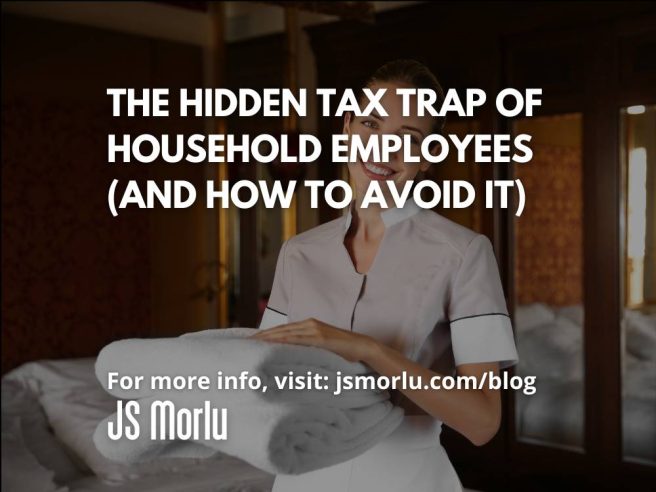Meet Linda and Mark—a busy Northern Virginia couple juggling careers, kids, and a golden retriever who sheds like it’s his job. To keep their household running smoothly, they hired a part-time housekeeper named Maria. They paid her in cash, skipped the paperwork, and figured they were just doing her a favor. But what they didn’t realize is that they were heading straight into a tax minefield.
If you’re paying a domestic worker—like a nanny, caregiver, or housekeeper—there’s a good chance you’re unknowingly stepping into employer territory. And with that comes a raft of IRS and state obligations.
Let’s break down what you need to know, and how JS Morlu can help you stay compliant while keeping your home life stress-free.
Cash May Be King—But Not With the IRS
It might seem simpler to pay household help under the table, especially if they’re open to it. No paperwork, no taxes, no problem… right?
Wrong.
If the IRS or your state’s employment department gets wind of this, the consequences can be steep. Think back taxes, penalties, and potential audits.
Plus, starting in 2025, payment apps like PayPal and Venmo will report transactions over just $600 on Form 1099-K (down from $5,000 in 2024). So even if you’re using digital platforms, Uncle Sam could still come knocking.
Who Counts as a Household Employee?
This part trips up a lot of well-meaning folks. According to the IRS, you’re considered an employer if you control what work is done and how it’s done. That includes:
- Nannies
- Housekeepers
- Senior caregivers
- Some gardeners
Not employees: licensed professionals like plumbers, electricians, and contractors who control how they do their job and bring their own tools.
Even if you have a contract or only pay them part-time, the IRS doesn’t care—you’re still on the hook.
Why Compliance Matters (Especially When Things Go Sideways)
Most people skip the paperwork because, well, they think everyone else is doing it. But imagine this: your nanny slips and falls while carrying your toddler. Suddenly she’s filing for unemployment or worker’s comp—and listing you as her employer. Now you’re exposed to:
- IRS audits
- State labor board inquiries
- Penalties for misclassification
Treating a domestic worker as an independent contractor and issuing them a 1099-NEC? That’s also a red flag for the IRS.
Your Household Payroll To-Do List
If you want to stay on the right side of the law, here’s what you need to do:
- Get a Federal Employer Identification Number (FEIN)
This is your household’s business ID for tax purposes. - Register with your state for unemployment and withholding taxes
- Withhold and match Social Security and Medicare taxes
For 2025, this applies if you pay a worker over $2,800 annually. - Optional Income Tax Withholding
Not required unless the worker requests it and you agree. - File state tax returns
Usually quarterly. Some states want them monthly. - Issue Form W-2 and file Schedule H with your 1040
Include all the federal payroll taxes and unemployment tax. - Keep business and household payrolls separate
Even if you own a business, household payroll must come from personal funds.
What About Babysitters and Teen Help?
The IRS still counts your weekend babysitter as a household employee in most cases, unless:
- They’re under 18 and not working as their primary job.
- They’re your child under 21 doing chores around the house.
Other Rules to Know
- Overtime: Household employees are generally not exempt. You must pay overtime after 40 hours/week. Live-in workers are often exempt.
- No salary loopholes: You can’t put a housekeeper on a “salary” to dodge overtime—hourly pay is required by law.
- Form I-9 compliance: Hiring someone to work in your home regularly? You must verify their eligibility to work in the U.S.
Smart Compliance Starts with JS Morlu
Navigating household employment taxes is complicated, but you don’t have to go it alone. At JS Morlu, we help high-net-worth individuals and families:
- Set up compliant household payroll systems
- Handle tax filings, W-2s, and Schedule H
- Mitigate audit risk and ensure peace of mind
Let’s face it—your home should be your haven, not your HR department. We’ll help you keep it that way.
Ready to Get Compliant (and Sleep Better at Night)?
Contact us today for a personalized consultation. Whether you’re hiring a nanny, housekeeper, or caregiver, we’ll help you do it right—the first time.
JS Morlu: Empowering Your Finances with Confidence.
JS Morlu LLC is a top-tier accounting firm based in Woodbridge, Virginia, with a team of highly experienced and qualified CPAs and business advisors. We are dedicated to providing comprehensive accounting, tax, and business advisory services to clients throughout the Washington, D.C. Metro Area and the surrounding regions. With over a decade of experience, we have cultivated a deep understanding of our clients’ needs and aspirations. We recognize that our clients seek more than just value-added accounting services; they seek a trusted partner who can guide them towards achieving their business goals and personal financial well-being.
Talk to us || What our clients says about us

